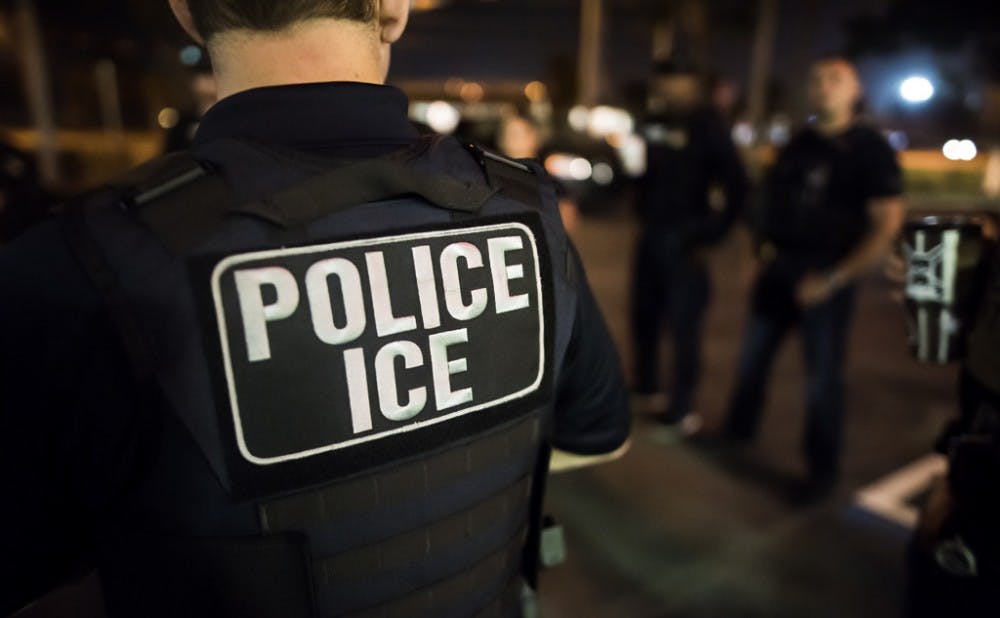Despite his voter fraud commission's failure to find evidence of rampant voter fraud, President Donald Trump and his administration's attempt to crack down on voter fraud has come to North Carolina.
On Aug. 31, 2018, Immigration and Customs Enforcement (ICE) subpoenaed 15 million documents of voting records from the the North Carolina State Board of Elections.
The North Carolina records office was demanded to give voter registration applications, among other documents, sent to from all of North Carolina between Jan. 1, 2010 and August 2018. This came one week after 19 foreign nationals were charged with voting illegally in North Carolina in the 2016 election, which one federal law enforcement official confirmed to CNN was the impetus for the subpoena.
ICE declined to comment to CNN, saying it could not comment on an "ongoing investigation."
Critics have argued that these few instances of illegal voting are not enough to warrant the demands made in the subpoena. The subpoena is the Trump administration's latest attempt to crack down on voter fraud, following a now-dismantled voter fraud commission. After an eight-month investigation, the team failed to find evidence of mass voter fraud committed by undocumented immigrants.
Shortly after his election, Trump falsely claimed that millions of undocumented immigrants voted illegally, costing him the popular vote. Gunther Peck, associate professor of history and of public policy studies, fears that the Republican push to end so-called “systematic voter fraud” will decrease voter turnout.
“There is a genuine fear that by linking voting to ICE, legal citizens might be anxious about voting because ICE has detained and rounded up people that are citizens," he said.
Peck noted that news of the request for records may result in voter intimidation, making people with constitutional guarantees of the right to vote anxious.
“It also weakens people’s trust in voting information, making them less likely to register to vote even if they are fully legal," he said.
In response to the subpoena, the state elections board voted unanimously to fight the federal demands at both the state and county levels, where 44 counties were also subpoenaed. Joshua Malcolm, state elections board vice chairman, called the demands "overly broad, unreasonable" and "vague."
"This board will....not stand idly by and consent to any agency attempting to obtain records and documents that violate the principles of overreach by the federal government," Malcolm said.
Additionally, the state election board called for the U.S. Attorney's Office to delay the deadline of the subpoena. The U.S. Attorney's Office granted this request, pushing the collection deadline until January 2019.
Peck said ICE’s request is unreasonable because the federal government’s request for poll workers to round up 15 million documents would be at the expense of administering an election, especially in the wake of Hurricane Florence.
Peck said the subpoena could also open the door to racial profiling.
“If you were to infer from how they do traffic stops, which is typically a form of racial profiling, it is possible that they would do the same thing from voting records: look at Hispanic surnames and try to see if there are any inconsistencies—and there probably are—but that wouldn’t prove vote fraud and that wouldn’t prove that people are not citizens,” he said.
Ten civil rights groups, including The Southern Coalition for Social Justice, the North Carolina State Conference of the NAACP and the ACLU, wrote a letter to US Attorney General Jeff Sessions and Ron Vitiello, deputy and acting director of ICE, on Sept. 26, 2018 in an attempt to get the subpoenas withdrawn.
“The extremely broad and unprecedented subpoenas extend far beyond the scope of any legitimate law enforcement objective and threaten voters’ constitutional right to cast a ballot free from fear and intimidation as well as their expectation that their personally identifiable information…and their voting preferences will remain private,” they wrote in the letter. “Further, given the massive redactions necessary to avoid complete disregard for voters’ rights and the law, responding to these ICE Subpoenas would interfere with the duties of North Carolina’s election officials at any point in any election cycle.”
Get The Chronicle straight to your inbox
Sign up for our weekly newsletter. Cancel at any time.

